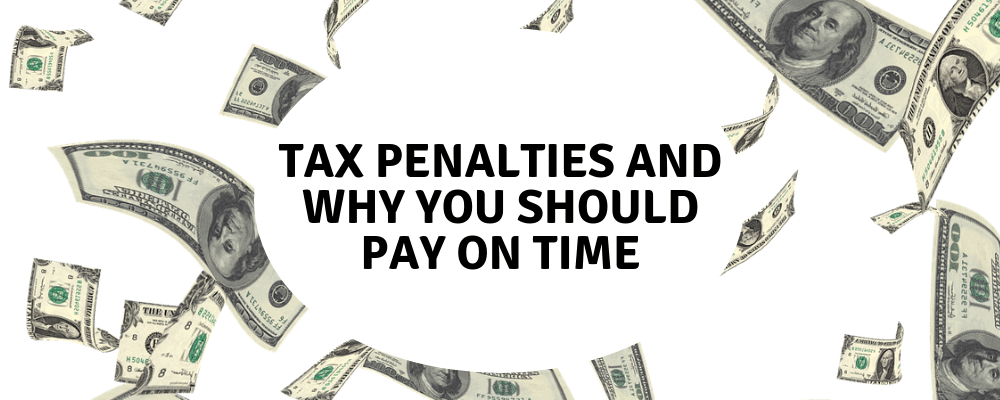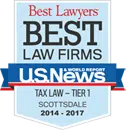Repercussions of Not Filing a Tax Return in Phoenix Repercussions of Not Filing a Tax…
Tax Penalties and Why You Should Pay on Time
No one likes paying their taxes – well, you’d be hard pressed to find someone who openly admitted that they loved paying taxes, anyway – but we all have to pay our part. You can’t just fail to file a return and expect to get away with not paying your taxes. The IRS will notice, and you will end up paying dearly. Sometimes, working with a Scottsdale tax lawyer can get you out of the mess that will create, but even the best Arizona tax lawyer won’t be able to eliminate your debt if you haven’t paid your taxes.

Failing to file or pay your taxes on time can lead to big penalties. Here’s a look at them and why you need to take care of your taxes on time:
Interest
For every day that you are late paying the taxes that the IRS says you owe, you will have to pay interest. It doesn’t matter if you filed your return in good faith, thinking that you had calculated everything correctly and paid what you owed. If the IRS finds an error on your return and says that you still owe money, you will be charged interest on that amount. The amount of interest depends on how much you owe.
In many cases, a Phoenix tax law lawyer can help you find ways to lower your tax obligation, and therefore the interest you owe, through means such as auditing your return and finding you additional tax deductions or credits.
Penalties
Failing to pay your tax or file your return will also result in a penalty fee. You will be charged a fee for each infraction. So, if you fail to file and fail to pay what you would have owed on that return, you will be hit with two penalty fees. You can also be assessed a fee if you underpay accidentally or if you pay with a check that is returned for insufficient funds.
Not only will you have to pay the fees that you are assessed, but you will also have to pay interest on those fees. Multiple fees and the interest on those fees over time can quickly add up to a lot of money over time. Working with an experienced Phoenix tax lawyer will help you find ways to minimize your penalties or your tax obligation.
Amounts
The IRS is quite clear about the penalties and interest it charges. Here are some guidelines:
Penalty of 5 percent of tax owed if you fail to file
Penalty is assessed for each month that the filing is late, for up to five months or 25 percent of the tax owed (amount is charged for partial months, as well)
If a return is more than 60 days late, the penalty is $210 or 100 percent of the tax owed, or whichever is less.
Penalty of 0.5 percent of tax owed is assessed for late payment. The amount is charged for every month (or fraction) that the tax is not paid, for a maximum of 25 percent of the tax owed.
If you owe a penalty for late filing and late payment, the late payment penalty will be waived for that month.
Every situation is unique, so you may be charged more or less penalties, depending on the circumstances of your case. The best way to minimize your penalties is to file and pay your taxes on time.
Timing
The longer you delay filing your tax return or paying the tax you owe, the more you are going to end up paying in penalties and interest. Even if you know that you can’t pay your tax, you must file your return on time. You’ll avoid an unnecessary penalty and the associated interest just by filing your return. Then you can ask for an extension to pay the tax you owe, or you can set up a payment plan to pay the tax you owe, so that you can avoid the penalty and interest for underpaying.
A Scottsdale tax attorney can help you apply for an extension or a payment plan to increase your chances that your request will be approved and that you’ll be able to afford handling your tax obligation.
Exceptions
You may be able to avoid paying penalties and interest if you can show that you have a valid reason for filing your return or paying your taxes late. For example, you may have been laid up in the hospital after a serious accident. However, what may seem like a good reason to you may not seem like a good reason to the IRS, so don’t expect every application to be approved. Consult with and hire a good Arizona tax lawyer to determine your best defense and to create a strong application if you think that you could qualify for the exception.
You can’t get around paying your taxes. Instead of trying to avoid them and getting charged serious penalties and interest, you should consult with a Scottsdale tax law lawyer to explore your options and find other ways of meeting your obligations.
The experienced attorneys at Silver Law PLC can help. Our team of attorneys have all worked for the IRS, so they have a unique understanding of how the agency handles these cases. A Phoenix tax law lawyer from our team may be able to audit your return to find ways to lower your tax obligation, help you apply for an extension of your return, help you negotiate a settlement to pay your debt, or help you qualify for an exemption. Contact us today to talk with an Arizona tax lawyer if you are being charged late payment or filing penalties, or if you know that you are going to file late or are not going to be able to fulfill your tax obligation.

Email: lchapman@silverlawplc.com
Website: taxcontroversy.com
Arizona Location
7033 E. Greenway Pkwy, Ste 200
Scottsdale, AZ 85254
Office:(480) 429-3360
Henderson Location
410 South Rampart Blvd, Suite 390
Las Vegas, Nevada 89145
Office: (702) 801-1000
Las Vegas Location
410 South Rampart Blvd, Suite
390 Las Vegas, Nevada 89145
Office: (702) 726-6819
San Diego Location
7676 Hazard Center Drive, Suite
1525 San Diego, CA 92108
Office: (619) 387-3790
Coronado Location
724 1st St.
Coronado, CA 92118
Office: (619) 612-5337
Utah Location
11576 S. State Street, Suite 1002
Draper, Utah 84020
Office: (801) 340-7514
















Leave a Reply
You must be logged in to post a comment.